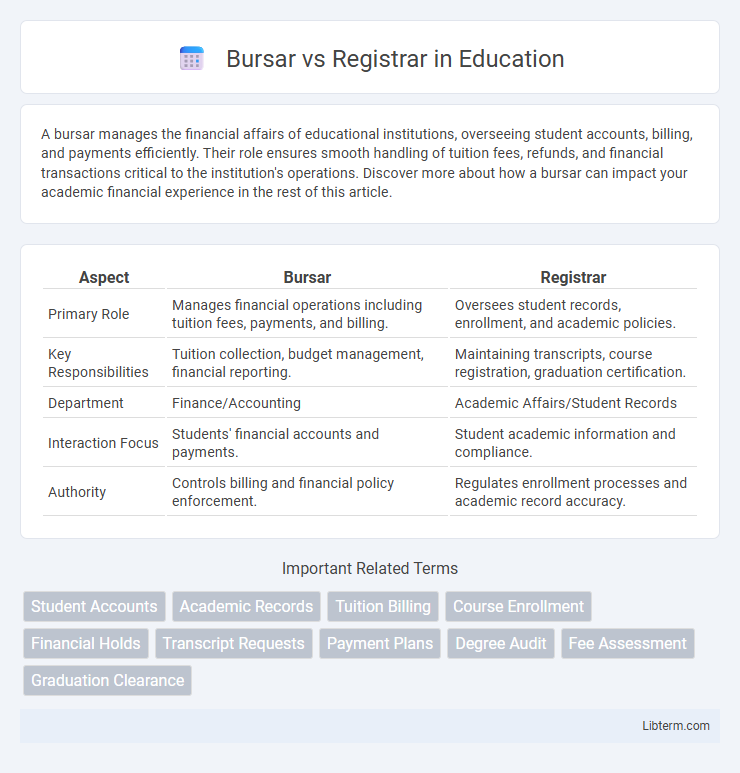A bursar manages the financial affairs of educational institutions, overseeing student accounts, billing, and payments efficiently. Their role ensures smooth handling of tuition fees, refunds, and financial transactions critical to the institution's operations. Discover more about how a bursar can impact your academic financial experience in the rest of this article.
Table of Comparison
| Aspect | Bursar | Registrar |
|---|---|---|
| Primary Role | Manages financial operations including tuition fees, payments, and billing. | Oversees student records, enrollment, and academic policies. |
| Key Responsibilities | Tuition collection, budget management, financial reporting. | Maintaining transcripts, course registration, graduation certification. |
| Department | Finance/Accounting | Academic Affairs/Student Records |
| Interaction Focus | Students' financial accounts and payments. | Student academic information and compliance. |
| Authority | Controls billing and financial policy enforcement. | Regulates enrollment processes and academic record accuracy. |
Understanding the Roles: Bursar vs Registrar
The Bursar manages financial operations, including tuition billing, student payments, and budgeting within educational institutions, ensuring accurate financial records and compliance. The Registrar oversees student records, enrollment processes, academic schedules, and graduation documentation, maintaining data integrity and supporting academic administration. Together, these roles support the operational and academic functions essential for institutional effectiveness.
Core Responsibilities of a Bursar
The Bursar primarily manages the institution's financial operations, including tuition billing, student account management, and collecting payments. This role also oversees budgeting, financial reporting, and coordinating with other departments to ensure accurate financial records. Unlike the Registrar, who handles academic records and course registrations, the Bursar focuses on the financial administration essential for institutional sustainability.
Key Duties of a Registrar
The Registrar is primarily responsible for maintaining student records, managing course registration, and overseeing academic scheduling to ensure smooth institutional operations. They handle transcript requests, verify academic credentials, and coordinate with faculty on enrollment data. Their role ensures compliance with academic policies and supports institutional accreditation processes.
Financial Management: The Bursar’s Focus
The Bursar primarily manages the financial operations of an institution, including tuition billing, fee collection, and student account management. This office ensures accurate processing of payments, financial record-keeping, and coordination of refunds or payment plans. In contrast, the Registrar handles academic records and course registration, with limited involvement in direct financial transactions.
Academic Records: The Registrar’s Domain
The Registrar manages academic records, maintaining accurate student transcripts, enrollment data, and degree certifications essential for institutional integrity and student verification. This office ensures compliance with educational regulations, data privacy laws, and coordinates with faculty to update course completions and grades systematically. In contrast, the Bursar focuses primarily on financial accounts, billing, and payment processing, separate from the academic documentation handled by the Registrar.
How Bursars Support Students
Bursars support students by managing tuition payments, financial aid disbursements, and billing inquiries, ensuring clear and accurate communication about their financial obligations. They oversee payment plans and coordinate with other departments to resolve account holds that could affect course registration and access to transcripts. By streamlining these financial processes, bursars help reduce barriers to enrollment and retention, directly contributing to a smoother student experience.
The Registrar’s Role in Student Services
The Registrar plays a crucial role in student services by managing academic records, enrollment verification, and course registration processes, ensuring accurate maintenance of student data. This office also coordinates graduation applications and official transcript requests, supporting students' academic progress and credential verification. Unlike the Bursar, who handles financial transactions, the Registrar focuses on academic administration and compliance with educational policies.
Overlapping Functions and Collaboration
The Bursar and Registrar share overlapping functions in managing student records, tuition billing, and enrollment verification, requiring continuous collaboration to ensure accurate financial and academic data synchronization. Both offices coordinate closely to facilitate timely tuition payment processing while maintaining up-to-date enrollment status for compliance and reporting purposes. Streamlined communication between the Bursar and Registrar enhances student services by preventing discrepancies in financial holds and registration privileges.
Bursar vs Registrar: Key Differences
The Bursar primarily manages an institution's financial operations, including tuition billing, student accounts, and payment processing, while the Registrar oversees academic records, course enrollment, and graduation requirements. The Bursar's role centers on fiscal accountability and cash flow management, contrasting with the Registrar's focus on maintaining student records, class schedules, and regulatory compliance. Understanding these distinctions clarifies institutional workflows where the Bursar ensures financial transactions, and the Registrar maintains academic integrity.
Choosing the Right Contact for Student Needs
When addressing student financial concerns such as tuition payments, billing inquiries, and financial aid distribution, the Bursar's Office is the appropriate contact. For matters related to course registration, academic records, transcripts, and enrollment verification, students should reach out to the Registrar's Office. Identifying the correct office streamlines support and ensures efficient resolution of student requests.
Bursar Infographic

 libterm.com
libterm.com